Osburn Surname Ancestry ResultsOur indexes 1000-1999 include entries for the spelling 'osburn'. In the period you have requested, we have the following 91 records (displaying 1 to 10): Single Surname Subscription | | | Buying all 91 results of this search individually would cost £518.00. But you can have free access to all 91 records for a year, to view, to save and print, for £100. Save £418.00. More... |
These sample scans are from the original record. You will get scans of the full pages or articles where the surname you searched for has been found. Your web browser may prevent the sample windows from opening; in this case please change your browser settings to allow pop-up windows from this site. Suffolk Poll Tax Returns: Chevington
(1381)
Edgar Powell transcribed and edited the poll tax returns for Thingo and Lackford hundreds (Public Record Office Lay Subsidy Suffolk 180/34, 38, 43, 49 and 52) for his study of the peasants' rising of 1381. Full lists of adults are given, township by township, under the heads armiger (esquire, rated at 6s), agricole (farmers, 3s a head), artifices (craftsmen, at 2s, often with their trade specified), laboratores (labourers, 12d), and servientes (servants, 4d to 12d a head, sometimes with their master's name given). There are returns for Barrow, Brockley-cum-Rede, Chevington, Flempton, Fornham All Saints, Hargrave, Hawsted, Hengrave, Horningsheath Magna, Horningsheath Parva, Ickworth, Lackford, Mildenhall, Nowton, Risby, Saxham Magna, Saxham Parva, Westley, and Whepsted.OSBURN. Cost: £4.00.  | Sample scan, click to enlarge

| Tenants, founders and incumbents of Yorkshire chantries
(1546-1548)
Chantries were established to perform services for the souls of their founders and other faithful dead, including annual obits and anniversaries at which alms were usually distributed. The chantries could be at an existing altar in a parish church, a new altar in a side chapel of an existing church, in a new chapel in the churchyard or some miles from an existing church: few were founded before 1300, and most date from 1450 to 1500. Hospitals were places provided by similar foundations to receive the poor and weak; there were also religious guilds, brotherhoods and fraternities, and colleges (like large chantries at which three or more secular priests lived in common). An Act of Parliament of 1545 gave king Henry VIII the power to dissolve such chantries, chapels, &c., the proceeds to be devoted to the expenses of the wars in France and Scotland. Commissioners were appointed 14 February 1546 to survey the chantries and seize their property, and from 1546 to 1548 the commissioners produced these certificates giving brief details of the establishment and nature of each foundation, with an inventory of valuables and rental of lands. The individuals named in the certificates are thus the founder, the present incumbent, and the tenants whose rents provided the chantry's income. All the surviving certificates were edited by William Page for the Surtees Society, and published from 1892.OSBURN. Cost: £6.00.  | Sample scan, click to enlarge

| Liegemen and Traitors, Pirates and Spies
(1547-1550)
The Privy Council of Edward VI was responsible for internal security in England and Wales, and dealt with all manner of special and urgent matters
OSBURN. Cost: £4.00.  | Sample scan, click to enlarge

| Tradesmen of York
(1272-1558)
No man or woman could trade in the city of York without having obtained 'freedom' of the city.Their names were recorded on the 'Freemen's Roll', or Register of the Freemen of the City of York, which contains about 19,900 names for this period. A list of names was prepared for each year, the year being here reckoned as starting at Michaelmas (29 September) until 1373, and thence at Candlemas (2 February). Each annual list starts with the name of the mayor and the camerarii or chamberlains. The chamberlains were freemen charged with the duty of receiving the fees of the new freemen; of seeing that only freemen traded in the city; and of preparing this roll, which was compiled from the names on their own account books from the receipts for the fees. There are three groups of freemen: those who obtained freedom after serving out an apprenticeship to a freeman; the children of freemen; and those who claimed freedom by 'redemption', i. e. by purchase or gift from the Mayor and Court of Aldermen.
OSBURN. Cost: £2.00.  | Sample scan, click to enlarge

| London Inquisitions Post Mortem
(1577-1603)
Full and complete abstracts of inquisitions post mortem for the City of London in this period. These are inquiries as to the real estate and heir of each person holding in capite or in chief, i. e. directly, from the Crown. The precise date of death of the deceased and the age and relationship of the heir are usually recorded. This index covers all names mentioned, including jurors, tenants, &c. This abstract also includes a handful of earlier items omitted from previous volumes.OSBURN. Cost: £4.00.  | Sample scan, click to enlarge
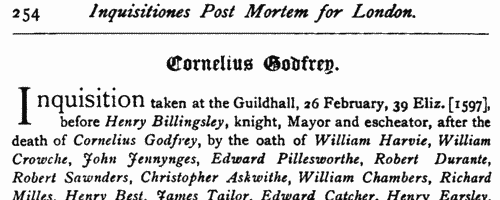
| House of Lords Proceedings
(1690-1691)
Private bills dealing with divorce, disputed and entailed estates: petitions, reports and commissions: naturalisation proceedings.
OSBURN. Cost: £4.00.  | Sample scan, click to enlarge
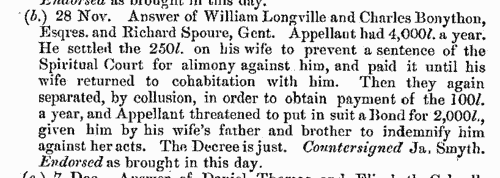
| Official Papers
(1700-1702)
The State Papers Domestic cover all manner of business relating to Britain, Ireland and the colonies, conducted in the office of the Secretary of State as well as other miscellaneous records. Includes lists of passes to travel abroad. This abstract covers the period from 1 April 1700 to 4 March 1702, with an appendix of items dating back as early as 1689.
OSBURN. Cost: £4.00.  | Sample scan, click to enlarge

| Treasury Books
(1702)
Records of the Treasury administration in Britain, America and the colonies, for 1702. Also includes Treasury minutes for early 1691; secret service accounts from 1689 to 1702, and accounts of the Civil List (royal expenditure) and army debts that had accumulated by the time of the death of king William III (8 March 1702).
OSBURN. Cost: £4.00.  | Sample scan, click to enlarge
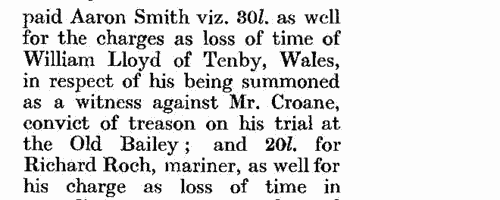
| Inhabitants of New Jersey
(1664-1703)
The proprietary government of New Jersey was surrendered to the Crown in 1703. The substantial early records of the colony from 1664 to 1703 were calendared by William Nelson and published by the New Jersey Historical Society in 1899 - East Jersey Libri 1, 3, 4, A, B, C, D, E, F and G; and from West Jersey the registers of New Salem Town Grants, Revel's Book of Survey, Fenwick's Surveys, Salem Surveys, Salem Deeds, Greenwich Town Lote and Gloucester Deeds. The material surveyed includes Indian deeds, patents and other conveyances, confirmatory patents, licences for purchase of lands from the Indians, town charters, court proceedings, military and civil commissions, and allowances of land for immigrant servants; but marriage certificates were omitted from this calendar, being reserved for a separate publication. OSBURN. Cost: £4.00.  | Sample scan, click to enlarge
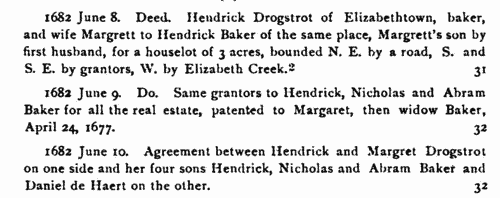
| State Papers Domestic
(1702-1703)
The State Papers Domestic cover all manner of business relating to Britain, Ireland and the colonies, conducted in the office of the Secretary of State, as well as other miscellaneous records. 1 March 1702 to 31 May 1703. The calendar was prepared by Robert Pentland Mahaffy, with certain classes of document extracted and placed in separate appendices (called Tables): I, caveats; II, church and university appointments, &c.; III, commissions, warrants for commissions, notes of commissions and notes of warrants for commissions in the English army for 1702; IV, lord lieutenants and deputy lieutenants; V, Irish warrants; VI, weekly lists of ships of the Home Fleet with their stations and orders; VII, passes, notes of passes, post warrants and licences of absence; VIII, orders on petitions; IX, Scottish warrants and commissions; and X, miscellaneous royal warrants (to the Attorney or Solicitor General; in criminal cases; diplomatic; military warrants; miscellaneous warrants; secretary's warrants, allowance of bills, &c.; and notes of warrants for the appointment of almsmen). The source material in the Public Record Office that he drew on in making this compilation is referenced throughout, and is from the State Papers Domestic (and Military, Naval, Signet Office, Various, and Letter Books and Entry Books), State Papers Scotland (Correspondence, Letter Books and Warrants), State Papers Ireland (and King's Letter Books), and State Papers Channel Islands.
OSBURN. Cost: £4.00.  | Sample scan, click to enlarge
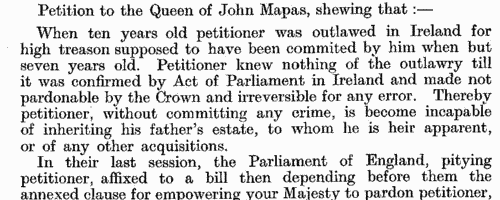
|
Research your ancestry, family history, genealogy and one-name study by direct access to original records and archives indexed by surname.
|












